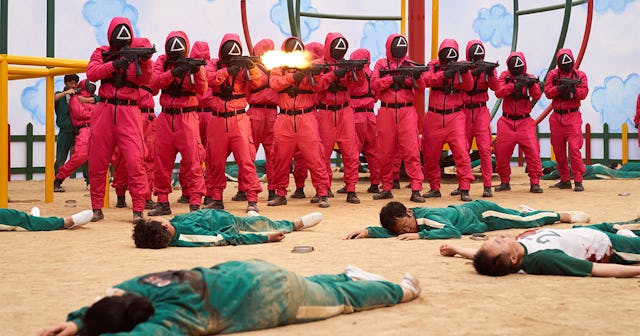No, Your 9-Year-Old Shouldn't Be Watching 'Squid Game'

Parents should be talking to their kids about the show’s premise
Even if you’ve not yet seen Squid Game, you’ve likely heard all about it. It’s Netflix’s biggest series launch in its history and people of all ages have been raving about it — especially teens. But is it ok for younger kids to watch? The answer is an absolute nope.
Squid Game is a Korean thriller that takes place on a remote island where people are forced to play childhood games like tug of war, red light-green light, and one specific to Korea — squid game. They are playing a deadly game to win a $38 million cash prize. The nine-episode series chronicles the games and the losers who are immediately gunned down and tortured in bloody and violent ways.
The series has been given a TV-MA rating, which means “this program is specifically designed to be viewed by adults and therefore may be unsuitable for children under 17. This program may contain one or more of the following: crude indecent language, explicit sexual activity, or graphic violence,” and Squid Game has it all.
Common Sense Media’s opinion is that kids over 16 should be able to watch but warn that the content of the series is violent. “Parents need to know that the level of violence is very intense in Squid Game,” the org said on its website. “Characters are systematically tortured and killed for the sadistic pleasure of a game master. Adults have sex, and there are threats of sexual violence: Women are grabbed by the hair and beaten.”
According to Psychology Today, letting our kids watch scary movies likely won’t scar them for life, but can lead to “some transient fears such as increased fear of the dark and strangers, trouble sleeping, and some nightmares.”
One reason it’s not suitable, especially for young kids, is their brains are not fully developed until we are around 25, and kids around nine-15+ especially can feel overwhelmed and anxious by what they are seeing, especially since they are playing games familiar to what they’d play at school.
“Many parents think, ‘My child can understand and differentiate between reality and fiction,'” Laura Linn Knight, a parenting educator and former elementary school teacher, told TODAY Parents. “But children cannot differentiate as much as we think. So when we’re sending in these images and expecting them to do what an adult can do, it’s unrealistic for them.”
She continued: “They’re taking childhood games that they’re playing on the school yard, like red light/green light and tug of war, so children are actively playing these games with their friends. Now they’re being exposed to it in a way where killing is involved and it’s life-threatening.”
Of course, because the show is so popular with teens, younger kids want in on the action and want to watch it themselves. Bottom line — you know your kids but you may not always know the depth to which they process this type of violence. When it comes to our kids’ health and well-being, playing it safe with this one may be the best option.